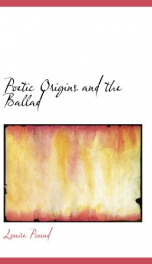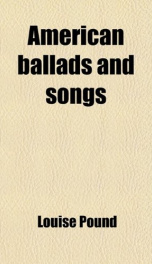poetic origins and the ballad

Purchase of this book includes free trial access to www.million-books.com where you can read more than a million books for free. This is an OCR edition with typos. Excerpt from book: CHAPTER III BALLADS AND THE ILLITERATE " A ballad," says F. Sidgwick, " is, and always has been, so far from being a literary form that it is in its essentials not literary, and it, we shall see, has no single form. It is of a genre not only older than the Epic, older than Tragedy, but older than literature, older than the alphabet. It is lore, and belongs to the illiterate." " You cannot write a popular ballad; in truth you cannot even write it down. At best you can but record a number of variants, and in the act of writing each one down you must remember that you are helping to kill that ballad." Professor Gummere speaks of " The homogeneous and unlettered state of the ballad-makers " and remarks that " Indeed, paper and ink, the agents of preservation in the case of ordinary verse, are for ballads the agents of destruction." 2 Professor Charles S. Baldwin refers to " unrecorded tales; tales not written but sung; tales composed, not for gentlefolk, but for the common unlettered people. These are the ballads." " Beginning in whatever way among the common people," he continues, " they were cherished, circulated, and handed down among the common people." 3 1 The Ballad, pp. 7, 39. 2 The Popular Ballad, and " Ballads " in A Library of the World's Best Literature. English Mediceval Literature, pp. 242, 331. When contemporary English and American scholars speak of " ballads " they have reference to narrative songs of the character of those included by Professor F. J. Child in his English and Scottish Popular Ballads. Although Professor Child's name, " popular" ballads, is much the safer name, it is customary to speak of the pieces in his collection as " traditional" ballads, and to think of oral preservation as a test of their inclusion. In fact, it is pretty widely ... --This text refers to an alternate Paperback edition.
Info about the book
Author:
Series:
Unknown
ASIN:
B0088I7B1M
Rating:
4/5 (4)Your rating:
0/5
Languge:
English
Users who have this book
Users who want this book
What readers are saying
What do you think? Write your own comment on this book!
write a commentif you like poetic origins and the ballad try:
Other books by this author
Do you want to exchange books? It’s EASY!
Get registered and find other users who want to give their favourite books to good hands!



